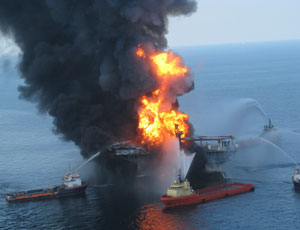After more than an eight-month lull in deepwater oil and gas activity in the Gulf of Mexico, the Bureau of Ocean Energy Management, Regulation and Enforcement on Feb. 28 approved the first deepwater drilling permit in the Gulf of Mexico since the Deepwater Horizon explosion on April 20, 2010.

“This permit represents a significant milestone for us and for the offshore oil and gas industry, and is an important step towards safely developing deepwater energy supplies offshore,” said BOEMRE Director Michael R. Bromwich in a statement. “This permit was issued for one simple reason: the operator successfully demonstrated that it can drill its deepwater well safely and that it is capable of containing a subsea blowout if it were to occur. We expect further deepwater permits to be approved in coming weeks and months based on the same process that led to the approval of this permit.
The agency — the former Minerals Management Service — approved Houston-based Noble Energy’s application for a permit to drill about 70 miles southeast of Venice, La. BOEMER made the award after Noble contracted with Houston-based Helix Energy Solutions Group to use Helix’s capping and containment device in the event of a blowout. After the explosion last year on the Deepwater Horizon, BOEMER required that such a capping and containment device be available in the event of an accident similar to that aboard the Deepwater Horizon.
In addition to Helix’s well containment device, the Marine Well Containment Company, a consortium formed by ExxonMobil, Shell, ConocoPhillips and Chevron, announced Feb. 17 it is ready to deploy its own capping and capture system for deepwater oil wells. BOEMER is still reviewing that system.
The federal government issued a moratorium on deepwater drilling on June 12 citing the possibility of explosions and leaks similar to that aboard the Deepwater Horizon. The oil and gas industry has been pushing for BOEMER to reopen drilling in the deep Gulf of Mexico, saying the shut down was hurting the Gulf economy and forcing business to other countries.
The American Petroleum Institute says a recent study by the consulting firm Wood Mackenzie shows that if the permit process is not speeded up, as much as 680,000 barrels of oil equivalent Gulf production a day could be at risk in 2019, and associated job losses could reach 125,000 per year by 2015.
The news of the permit was met with mixed reaction in the oil and gas industry.
“While every permit is welcome news, tightening the screws on domestic oil and natural gas production during a time of increased demand and global uncertainty is a formula for disaster. This slow moving process continues to stifle domestic production and puts thousands of jobs at risk in the Gulf and around the country,” said Jack Gerard, president of the American Petroleum Institute in a statement Monday.
Randall Luthi, president of the National Ocean Industries Association, said in a statement that while he has been critical of the BOEMER in recent months that, “Today’s action sends a calming signal to operators, producers and service companies that the long drought is just about over.”
Initial drilling on Noble’s well began April 16, 2010, in 6,500 ft water depth, and the activities were suspended June 12. The approved permit allows Noble to drill a bypass well. Such a bypass is necessary to drill around the plugs set in the original well when drilling was suspended last summer.

Post a comment to this article
Report Abusive Comment